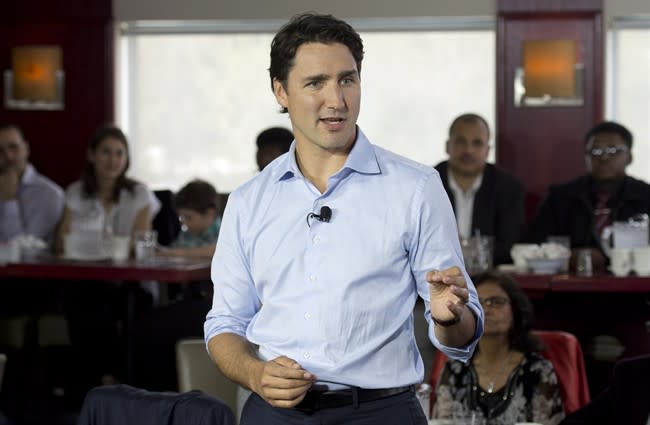 Canada Politics
Canada PoliticsTrudeau's tax plan ‘doable’ policy: economist

Liberal leader Justin Trudeau’s announcement Monday to tax the rich more heavily and tax the middle class less, and to enhance child benefits offered to families, is at first blush economically viable and sound — but there are caveats.
The Liberal plan, says one economist, is doable and is, essentially, making the tax and transfer system more progressive.
But Armine Yalnizyan, a senior economist with the Canadian Centre for Policy Alternatives said it creates a rhetoric that in order to beat the Conservatives in the next federal election, parties have to offer tax cuts.
“It’s the first foray of the Liberals in the wake of the extremely popular Harper budget,” Yalnizyan told Yahoo Canada News. It’s taking what’s in the Conservative’s budget, tabled in the House of Commons in April, and responding to it, she suggested.
Trudeau made his announcement at a family diner in Aylmer, Quebec, just outside of Ottawa, with a backdrop of parents and kids who, one would assume, will be the beneficiaries of the Liberals’ economic plans.
The policy ideas announced Monday include a new tax bracket for those making more than $200,000 a year and a cut in the tax rate for anyone earning an income between $44,701 and $89,401 from 22 per cent to 20.5 per cent.
Trudeau also said the party would do away with the Conservative government’s Universal Child Care Benefit and create something called the Canada Child Benefit, with benefit amounts tied to income.
He reiterated, as well, that the Liberals would scrap the Conservative’s income-splitting initiatives.
Monday’s announcement is one piece of what the Liberal Party will be rolling out ahead of the next federal election. The current plan doesn’t include mention of measures like day care or early learning initiatives, which Trudeau suggested would be on the table in the coming months.
Yalnizyan said that the party’s economic package, in all, is even bigger than what child poverty advocates have been asking for.
One concern though, Yalnizyan noted, is that if the Liberals aren’t done — which they’re not — and are still planning to roll out economic policies, the big question remains on where they will find the funds for something like a national child care program.
The Liberal announcement, too, is another example of parties competing over “who can give your money back the fastest,” Yalnizyan added.
Some are calling it an attempt at beating the Conservatives at their own game — the idea that more money in Canadians’ pockets is a good enticement for voters — but Yalnizyan said this isn’t how countries are built.
What Canada needs, and what might not happen in the election this year, is a bigger conversation about how the federal government is going to work with an ageing population in the years to come.
The Liberal announcement, and what the Conservatives are doing and likely what the NDP will be forced to do as weil, is fine “if all we want from our government is [for it to] give back our money,” she said.

